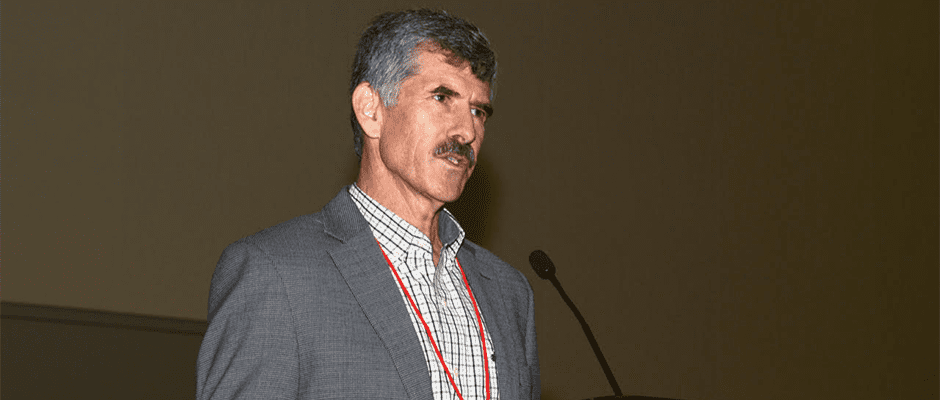Share this article
Seeking funds in new places
With funding for wildlife uncertain and conservation needs on the rise, conservation organizations are on the lookout for new sources to keep their efforts alive. Where will these dollars come from?
Speakers at Wednesday’s Caesar Kleberg Keynote, “The Future of Funding Wildlife Conservation,” had a range of ideas, from corporate coffers to private pockets to an unexpected suggestion for sustaining wildlife conservation efforts: run for office yourself.
“Fortunately, society has become increasingly interested in biodiversity and wildlife conservation,” said moderator Fidel Hernandez, a research biologist at the Caesar Kleberg Wildlife Research Institute, which sponsored the keynote.
The presentation included speakers from a range of conservation organizations sharing insights on how to sustain funding from the private sector. TWS CEO Ed Thompson shared the work of the society to find funding beyond membership dues. David Hewitt, executive director of the Caeser Kleberg Wildlife Research Institute, talked about its role as a privately funded research unit within a public university, Texas A&M University-Kingsville. TWS’ incoming president, Darren Miller, talked about his work as the new vice president for forestry programs at the National Council for Air and Stream Improvement, Inc., which conducts environmental work related to the forest products.
But it was Mike Phillips, executive director of the Turner Endangered Species Fund, who had the most surprising suggestion, which had nothing to do with the billionaire philanthropist who founded his organization. Phillips, a Montana state senator, urged members of the audience to run for office, “to improve our efforts on behalf of wildlife conservation and to find new money, new funding, for wildlife conservation.”
“If we do not insert conservation science into the decision-making process, somebody else’s science will get inserted,” he said, “and I don’t think we should be much motivated by the science idiots.”
For wildlifers not ready to put their names on the ballot, other speakers discussed the role that donors and corporations can play.
To fund its work, the Caesar Kleberg Wildlife Research Institute gets 60 percent of its funding from private sources, Hewitt said, despite its location in a small town in rural Texas with a median income of about $33,000.
“So how do we tap into that?” Hewitt asked. By doing applied research that’s relevant to people in the region, engaging them and asking for their support, he said.
“There’s people out there who would love to support us. They’ve just never been asked,” Hewitt said. “So we need to get out there and let them know, hey, here’s what we’re doing. Here’s our needs. If you could help us, great.”
Miller discussed his work with NCASI, an organization that provides research on sustainability and quality issues for the forest products industry. In the past four years, the organization’s environmental sustainability program has produced 146 published products, Miller said, including studies on northern spotted owls and barred owls in the Pacific Northwest and reptiles and amphibians in the Southeast.
“Once those issues get into the policy arena and the politics arena, sometimes it’s too late to be effective in influencing the policy discussion,” Miller said. “It’s important to think ahead and see what’s coming down the line and as much as possible address those needs ahead of time.”
“Think big,” he said. “Don’t constrain yourself to the way things are done now.”
Thompson spoke of the need to reach out to partners to help fund conservation efforts. Although TWS is a membership organization, just 22 percent of its funding comes from membership dues, he said. Without other sources, he said, professional members would pay in excess of $300 a year to fund the society’s programs and benefits.
“Be a business,” Thompson said. “Unless we really roll up our sleeves and recognize that our wildlife organizations, our wildlife membership organizations and professional societies are businesses we will not be successful in securing funding.”
Thompson spoke of encouraging the TWS Council to consider the society’s value proposition to members, as well as the services it can offer to other organizations. As a result, members have given bequests and stock options, and many have joined The 1,000 group of donors who pledge at least $100 a year. But it’s also allowed the organization to reach out to other organizations that have signed on as advertisers, exhibitors, sponsors and partners.
“Don’t just be a good partner,” he said. “Be a great partner. Once you set up a great partnership, it can become a sustainable revenue source for you that will be so impactful on your organization.”
A number of awards were also presented:
Distinguished Service Award: Western Section, Cynthia G. Perrine
Ronald H. Rusch Memorial Game Bird Scholarship Award: Kali K. Rush
Diversity Award: Carol L. Chambers
Jim McDonough Award: Paul R. Johansen








